Readings Newsletter
Become a Readings Member to make your shopping experience even easier.
Sign in or sign up for free!
You’re not far away from qualifying for FREE standard shipping within Australia
You’ve qualified for FREE standard shipping within Australia
The cart is loading…






Around 15,000 years ago, almost all humans lived in small mobile foraging bands. By about 5,000 years ago, the first city-states had appeared. This radical transformation in human society laid the foundations for the modern world. We use economic logic and archaeological evidence to explain six key elements in this revolution: sedentism, agriculture, inequality, warfare, cities, and states. In our approach the ultimate cause of these events was climate change. We show how shifts in climate interacted with geography to drive technological innovation and population growth. The accumulation of population at especially rich locations led to creation of group property rights over land, stratification into elite and commoner classes, and warfare over land among rival elites. This set the stage for urbanization based on manufacturing or military defense and for elite-controlled states based on taxation. Our closing chapter shows how these developments eventually resulted in contemporary global civilization.
$9.00 standard shipping within Australia
FREE standard shipping within Australia for orders over $100.00
Express & International shipping calculated at checkout
Around 15,000 years ago, almost all humans lived in small mobile foraging bands. By about 5,000 years ago, the first city-states had appeared. This radical transformation in human society laid the foundations for the modern world. We use economic logic and archaeological evidence to explain six key elements in this revolution: sedentism, agriculture, inequality, warfare, cities, and states. In our approach the ultimate cause of these events was climate change. We show how shifts in climate interacted with geography to drive technological innovation and population growth. The accumulation of population at especially rich locations led to creation of group property rights over land, stratification into elite and commoner classes, and warfare over land among rival elites. This set the stage for urbanization based on manufacturing or military defense and for elite-controlled states based on taxation. Our closing chapter shows how these developments eventually resulted in contemporary global civilization.